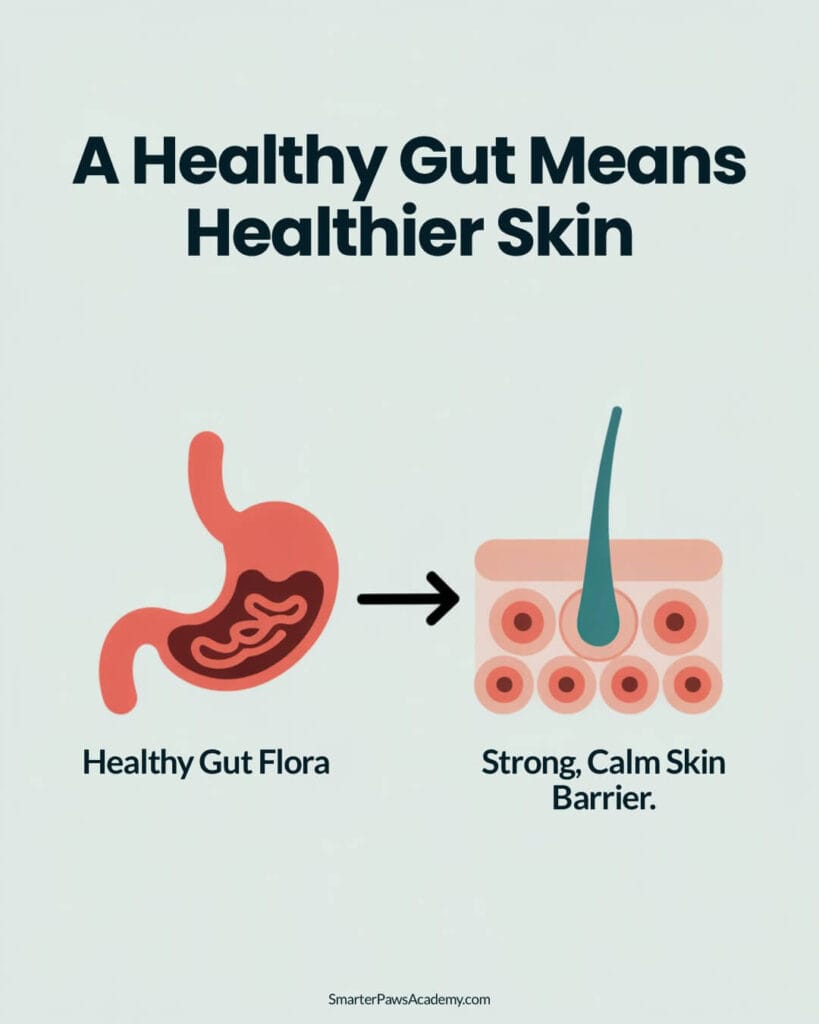The constant scratching, the chewing at paws, the endless shaking of ears watching your dog suffer from skin allergies is frustrating and heartbreaking. Studies show that up to 15% of dogs suffer from skin allergies, making it one of the most common reasons owners seek veterinary care.
As a certified dog trainer, I often see how this chronic discomfort can impact a dog’s mood, focus, and overall quality of life. You’re not just looking for a food; you’re looking for relief for a beloved family member.
While I am not a veterinarian, my work involves helping owners find holistic solutions to improve their dog’s well-being. This guide is designed to cut through the confusion and help you choose the best dry dog food for skin allergies for your companion. We’ll explain the key nutritional principles and review the top-rated foods that owners and vets trust to bring comfort to itchy dogs.
Smarter Paws Academy is reader-supported. When you buy through links on our site, we may earn an affiliate commission at no extra cost to you. As an Amazon Associate, I earn from qualifying purchases. Thank you for your support!
Important Health Disclaimer
The information in this article is for educational purposes only and is based on my experience as a certified dog trainer. It is not a substitute for professional veterinary advice. An accurate diagnosis for skin allergies requires a veterinarian. Please consult your vet to diagnose any health issues before making any significant changes to your dog’s diet.
Key Takeaways: Dog Food for Skin Allergies
- Protein is the Primary Culprit: True food allergies in dogs are most often an immune reaction to common proteins like beef and chicken, not necessarily grains.
- Look for Novel Proteins & Omegas: The most effective foods often use a “novel” protein (like kangaroo or duck) and are rich in Omega-3 fatty acids to reduce inflammation.
- A Vet Partnership is Essential: Finding the right food is a process. A strict 8-week food trial in partnership with your veterinarian is the gold standard for diagnosing and managing food allergies.
Prefer to Listen? An Audio Overview
For a conversational deep dive into this topic, press play below for my complete audio discussion on dog food for skin allergies.
Runtime: 1 minute 39 seconds
View Full Audio Transcript
Narrator: Welcome to the Smarter Paws Academy audio overview. Today, we’re tackling a frustrating issue for so many owners: finding the best dog food for skin allergies. Sandie, where should an owner even begin?
Sandie Calloway: It starts with understanding the “why.” That constant itching is often an immune reaction to a protein, usually common ones like beef or chicken. The most effective strategy is to switch to a food with a “novel protein”—something your dog has never eaten before, like kangaroo or duck.
Narrator: So it’s not always about “grain-free”?
Sandie Calloway: Exactly. While some dogs are sensitive to grains, the protein is the more common culprit. The other key is looking for foods rich in Omega-3 fatty acids, which are scientifically proven to reduce inflammation and support a healthy skin barrier.
Narrator: So a new food is the complete solution?
Sandie Calloway: It’s the most powerful long-term solution, but it’s not the only tool. In the article, we also cover complementary support, like specific medicated shampoos for immediate relief and Omega-3 supplements to boost the diet’s effectiveness. It’s about a holistic approach.
Narrator: What’s the most important piece of advice you can give?
Sandie Calloway: Patience. You must work with your vet and commit to a strict 8-week food trial, feeding nothing but the new food. It’s the only way to know for sure if it’s working. Finding the right food is a process, but it’s one of the most powerful ways to bring real, lasting relief to your dog.
Table of Contents
Understanding the Itch: What Really Causes Skin Allergies in Dogs?
Before you can find the right food, it’s important to understand what you’re up against. According to the veterinary nutrition experts at Tufts University, it’s crucial to distinguish between a true food allergy and a food intolerance.
- A true food allergy is an immune response to a specific ingredient, usually a protein. This causes intense itching and skin inflammation.
- A food intolerance is a digestive issue that can also cause skin problems alongside issues like gas or diarrhea.
For both conditions, the solution often lies in identifying and removing the problem ingredient. The most common protein culprits in dog food are surprisingly the ones dogs eat most often: beef and chicken.
The Link Between Diet and Yeast Infections
Many owners battling skin issues also notice a distinct “yeasty” smell. This is often due to an overgrowth of yeast that thrives when the skin barrier is compromised by allergies and scratching. While the allergy is the root cause, some evidence suggests that diets high in sugary carbohydrates and fillers can create an environment where yeast multiplies. This is why many successful allergy-focused diets are built on specific proteins and are low in unnecessary starches.
Key Ingredients That Soothe Skin (And What to Avoid)
When you’re scanning a dog food label, it can feel overwhelming. Here are the key terms and ingredients you should be looking for to help your dog’s itchy skin.
Novel Proteins: The First Line of Defense
A “novel” protein is simply one your dog has likely never eaten before. Since allergies develop through exposure, switching to a protein their immune system has never seen can often stop the allergic reaction.
Clinical studies show that novel and hydrolyzed protein diets have a 50-80% success rate in managing canine food allergies, with significant improvement in itching often observed within the first 3 months of dietary change.
Omega-3 & Omega-6 Fatty Acids: The Skin Super-nutrients
These essential fatty acids are your best friend in the fight against inflammation. As confirmed by a peer-reviewed study in PubMed Central, Omega-3s (found in fish like salmon) are scientifically proven to help strengthen the skin barrier and reduce itching.
Pet parents typically see visible improvements within 2-4 weeks of starting omega-3 supplementation, while clinical studies show significant reduction in itching within 6 weeks of consistent use.
Probiotics & Gut Health: The Skin-Stomach Connection
A huge portion of your dog’s immune system resides in their gut. A healthy gut microbiome can lead to a more balanced immune response and healthier skin, a topic we explore in my guide to improving dog gut health naturally. Many dogs with skin allergies also experience digestive issues, so you may also want to read my guide to the best dog food for sensitive stomach.

How I Chose and Evaluated These Foods
My recommendations are based on a rigorous process: consulting with veterinary nutrition resources like Tufts, analyzing ingredient lists to ensure a single, novel protein source, prioritizing foods with omega-3 levels above 0.3%, and analyzing thousands of user reviews to select only products with at least a 75% 4-star or higher rating that specifically mention skin improvement.

The 5 Best Dry Dog Foods for Skin Allergies in 2025
This is my top pick for dogs with severe food allergies. Kangaroo is an exceptional novel protein that very few dogs have been exposed to, making it perfect for elimination diets. The limited ingredient formula minimizes potential allergens while providing complete nutrition. With 4.4 stars from thousands of reviews, owners report significant improvement in itching and skin inflammation within 4-6 weeks. The addition of apples provides natural antioxidants that support skin health from the inside out.
For dogs with complex or multiple allergies, this hydrolyzed protein diet is the gold standard. The salmon protein is broken down into molecular fragments so small that the immune system can’t recognize them as allergens. This makes it ideal for dogs who haven’t responded to novel protein diets. With 4.3 stars and over 284 reviews, it’s particularly effective for dogs who need a strict elimination diet under veterinary supervision. Important: This is a veterinary diet that typically requires authorization from your veterinarian.
This formula’s power comes from its exceptional concentration of Omega 3 & 6 fatty acids from salmon and flaxseed. These nutrients are scientifically proven to strengthen the skin barrier and reduce inflammation. With 4.5 stars from over 1,200 reviews, it’s an excellent choice for dogs whose primary issue is dry, flaky skin or seasonal allergies. The antioxidant-rich formula also includes vitamin E and other nutrients that support skin healing and coat recovery.
While chicken can be an allergen for some dogs, for those who are not allergic to it, this formula offers a unique approach through advanced gut health support. The guaranteed live probiotics help balance the immune system and reduce inflammatory responses that manifest as skin issues. With approximately 4.5 stars, it’s particularly effective for dogs who experience both digestive upset and skin problems, addressing the root cause of the gut-skin connection. This makes it an excellent choice for dogs with mild to moderate allergies.
This is my top budget-friendly recommendation that doesn’t compromise on quality. With real salmon as the #1 ingredient, it delivers essential omega fatty acids needed for skin support at an accessible price point. The formula includes vitamin E and other nutrients that specifically target skin health. With thousands of positive reviews and 10K+ monthly purchases, it’s proof that effective allergy management doesn’t have to break the bank. It’s an excellent starting point for dogs with mild skin sensitivities or for owners on a tighter budget.
Comparison Table: Top Foods for Skin Allergies
| Dog Food | Primary Protein | Key Benefit | Price Point |
|---|---|---|---|
| Addiction Wild Kangaroo & Apples | Kangaroo | True Novel Protein | $$$ |
| DIAMOND CARE Hydrolyzed Salmon | Hydrolyzed Salmon | Veterinary Elimination Diet | $$$ |
| Blue Buffalo Skin & Coat Care | Salmon | High in Omega Fatty Acids | $$ |
| IAMS Healthy Digestion | Chicken | Probiotic-Fortified | $ |
| Purina ONE Sensitive Skin & Coat | Salmon | Budget-Friendly | $ |
Beyond the Bowl: Complementary Support for Itchy Skin
While changing your dog’s diet is the most powerful long-term solution, it’s not the only tool you have. For a truly holistic approach, consider these additions to provide your dog with faster, more comprehensive relief.
Soothing Topical Treatments
To provide immediate relief from itching while the new food starts to work, an oatmeal-based shampoo can be incredibly soothing. For localized hot spots or irritated paws, medicated wipes are a convenient way to calm inflammation and prevent secondary infections from scratching.
While the new food does its work, your dog needs immediate relief. This medicated oatmeal shampoo is incredibly soothing and helps calm the itch right away during bath time. With 4.6 stars from nearly 35,000 reviews, it’s formulated with vitamin E to provide immediate relief from itching while supporting skin healing. The gentle formula is safe for regular use and won’t strip away natural oils that protect the skin barrier.
Perfect for targeting specific hot spots, itchy paws, or skin folds. These medicated wipes provide fast, convenient relief exactly where it’s needed most. The 3-in-1 formula contains hydrocortisone and antihistamine to immediately calm inflammation and itching. As an Amazon’s Choice product with hundreds of monthly purchases, they’re particularly effective for dogs who develop localized reactions between baths. The no-sting formula makes them gentle enough for sensitive areas while being powerful enough to stop the itch-scratch cycle.
For immediate relief of intense itching and hot spots between baths, this spray is a game-changer. The natural formula combines tea tree oil, aloe vera, and chamomile to provide fast-acting relief without stinging. With 4.2 stars from over 5,200 reviews, it’s particularly effective for dogs who develop sudden intense itching in specific areas. The alcohol-free, no-sting formula makes it gentle enough for raw, inflamed skin while being powerful enough to break the itch-scratch cycle that can lead to secondary infections.
The Power of Supplements
One of the best things you can add to your dog’s routine is an Omega-3 supplement, like high-quality fish oil. Clinical research shows that marine oil supplementation produces significant improvement in pruritus (itching) within 6 weeks, with many pet owners reporting noticeable results in just 2-4 weeks.
Adding fish oil is my #1 recommendation to complement any allergy diet. This liquid omega-3 supplement is a powerful, natural anti-inflammatory that provides concentrated support for skin and coat health. Made from wild Alaskan salmon oil, it delivers high levels of EPA and DHA that work synergistically with allergy-friendly foods. With 4.3 stars from over 13,000 reviews, pet owners report seeing improvements in coat shine and reduction in itching within 2-4 weeks of consistent use.
If your dog isn’t a fan of liquid oils, these chews are a perfect alternative. They combine salmon oil with other skin-supporting nutrients in a tasty, treat-like format. With 4.4 stars from over 6,600 reviews, these chews provide a comprehensive approach to skin health with omega-3s, biotin, and vitamin E. They’re particularly effective for dogs who need additional skin support beyond what their food alone provides, and the treat format makes them easy to administer even to picky eaters.
“How Long Will This Take?” – The 8-Week Food Trial Explained
Switching your dog’s food is not an overnight fix. It takes time for the old allergens to leave their system and for their skin to begin healing. While clinical studies show that 50-80% of dogs respond positively to novel protein diets within 3 months, most veterinarians recommend a strict 8-week elimination trial as the minimum period to properly evaluate food effectiveness, as detailed by experts in Today’s Veterinary Practice.
To accurately track progress, I recommend keeping a simple symptom journal. Take a photo of the most affected skin areas at the start of the trial and once a week thereafter. Rate your dog’s itching on a scale of 1 to 10 each day. This objective data will be invaluable for you and your vet.
Frequently Asked Questions (FAQs)
What food should I avoid for dogs with skin allergies and yeast?
You should primarily avoid foods with common protein allergens like beef and chicken. Additionally, for yeast issues, it’s wise to avoid foods with high levels of sugary fillers and carbohydrates like corn and wheat, as they can contribute to yeast overgrowth. Focus on limited ingredient diets with novel proteins.
Is chicken or beef worse for dog allergies?
Both chicken and beef are the most common food allergens in dogs, simply because they have been the most common ingredients in dog food for decades. One is not inherently “worse” than the other; it depends entirely on what your individual dog has developed a sensitivity to.
How long after switching dog food will allergies go away?
You should commit to a strict 8-week elimination trial. While some owners report seeing improvements in itching within 2-4 weeks, it can take up to 12 weeks for all the old allergens to clear your dog’s system and for the skin to fully heal. Be patient and consistent.
What protein is best for dogs with skin allergies?
The best proteins are typically novel proteins your dog hasn’t been exposed to before. Kangaroo, duck, venison, and salmon are excellent choices. The key is selecting a protein source that your dog’s immune system doesn’t recognize as a threat, which is why these diets have a high success rate.
Is chicken bad for dogs with skin allergies?
Chicken isn’t inherently “bad,” but it is the most common food allergen in dogs due to widespread exposure. If your dog has allergy symptoms, chicken should be one of the first ingredients eliminated during a food trial. However, it depends entirely on your individual dog’s immune system.
What kills yeast on dogs’ skin?
Yeast is managed through a combination of approaches. Medicated shampoos can reduce yeast on the skin’s surface. However, the most effective long-term solution is addressing the underlying cause usually allergies through diet. Reducing carbohydrates in your dog’s food can help create an internal environment less hospitable to yeast.
What natural ingredients are good for dogs’ itchy skin?
Several natural ingredients can help. Oatmeal (in shampoos) and aloe vera (topically) can soothe irritation. Internally, Omega-3 fatty acids from fish oil are powerful anti-inflammatories, and probiotics support gut health, which is closely linked to skin condition.
How do you properly change dog food for allergies?
Transition gradually over 7-10 days, slowly mixing the new food with the old. During the 8-week elimination trial, you must be strict: eliminate all other potential allergens, including treats, table scraps, and flavored toys to get accurate results.
What can I put on my dog’s skin to stop itching?
For immediate, temporary relief, you can use oatmeal-based shampoos, diluted apple cider vinegar sprays, or aloe vera gel. These are soothing but don’t solve the root cause. For persistent itching, a proper veterinary diagnosis and dietary management are crucial.
Beyond the Bowl: Finding Lasting Relief for Your Itchy Dog
The journey to find the right food for your allergic dog can feel long, but it is one of the most impactful things you can do for their health and happiness. By focusing on high-quality ingredients, understanding the power of novel proteins and omegas, and working in partnership with your veterinarian, you can find a nutritional solution that works. Seeing your dog finally relax, free from the constant urge to scratch, is one of the most rewarding experiences an owner can have.
It’s worth noting that many dogs with skin allergies also struggle with digestive issues. The connection between gut health and skin health is well-established, which is why I’ve created a comprehensive guide to finding the best dog food for sensitive stomach if your dog experiences both symptoms.













